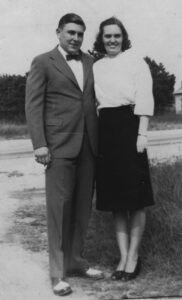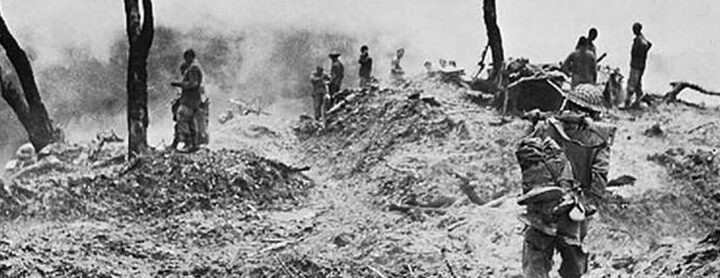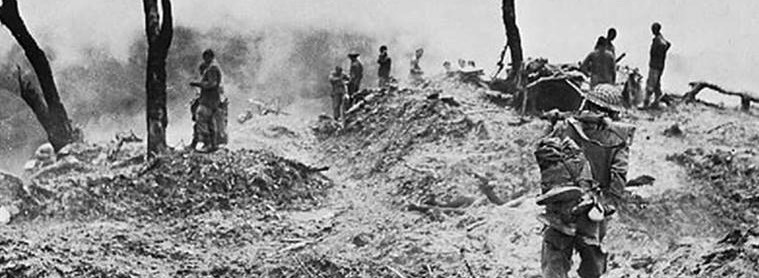My brother was 15 and I was 18 when our father died Dec. 4, 1971 — 20 days short of his 46th birthday. Initially it was thought he died of a heart attack; he’d been sick all that previous year. However, after years of reflecting on his symptoms, I now believe he died of a pulmonary embolism, given that he suffered from phlebitis and blood clots in his legs.

George Ernest Buie Jr. with his sister, Catherine, on the day of his high school graduation.
Overall, however, I’ve come to think that our father died from the long-term effects of undiagnosed PTSD from his service in World War II. During the last months of my senior year in high school, I slept on the living room couch so I could nurse our father through his bouts of phlebitis, waking every two hours without an alarm to change warm, wet dressings on his legs. In his delirium he would call out names, and Mother said they were his army buddies. One of them, his best friend, was blown to bits right beside him.
Daddy was the last man on patrol in Burma when he was shot in the back by a Japanese sniper. The bullet came out his hip and left him with one leg shorter than the other. He spent 11 months stateside in a veterans’ hospital recovering, including learning how to walk again. His wounds put an end to a football scholarship that was waiting for him at Georgia Tech, where he would have become “a rambling wreck from Georgia Tech and a heckuva engineer.” I still have a photo of him in his high school football uniform.
Our father believed with all his heart in good citizenship, public service and helping his fellow human beings. He and Mother voted in every election, no matter how small. He was a volunteer firefighter and chief of the department. He was a special sheriff’s deputy. He could build or repair anything. He was one of the best welders ever, and he was an excellent cook. He played the clarinet in high school. He also suffered from undiagnosed clinical depression and once terrified us by grabbing his service revolver and declaring he was going to kill himself. He could alternate between the “1,000-yard stare” of a shell-shocked soldier and the towering rage of a man who had seen too much of life’s worst. For all his emotional violence, he never once struck his wife or children in anger. Never.
“Our father believed with all his heart in good citizenship, public service and helping his fellow human beings.”
He was a devoted husband and father who was “Chapter Dad” to the local DeMolay Masonic youth organization. Masonry became his church, because Protestant churches failed so badly to practice what they preached, whereas the Masons never failed him, nor he them. He believed in the brotherhood of man under the all-seeing eye of God and served as Worshipful Master of his lodge.
Our father missed all our adult lives, my brother and me. I often wonder what he would have thought of having a globe-trotting journalist for a daughter, given that he always was struggling to teach me how to “behave like a lady,” (at least the 1950s idea of a lady). I know I gave him a lot of grief, as children can. But I think he would have greatly loved his grandsons and his granddaughters and delighted in his great-grandchildren, including the baby girl who’s experiencing her first Christmas this year.
I also know that if he were alive today, he would have nothing but contempt for the current political environment that is promulgating “big lies” about American democracy. My father died from the after-effects of his defense of democracy, and I’ll never forget that. Nor will I ever stop honoring his memory by standing against the assault on democracy currently taking place in the United States. I won’t carry a gun, but I pray my pen will be mightier than any sword of authoritarianism.
I miss George Ernest Buie Jr. (“Ernie” to some) with all my heart. With all his faults and flaws, all his gifts and graces, he was a man who said the day before he died, “When the Great Master calls me, I’m ready to go.” That knowledge has comforted me for the past half-century, and I look forward to the day when we’re reunited in Jesus’ embrace. Christmas Eve will always be Daddy’s birthday, just like Christmas Day belongs to Jesus.
Rest in peace, Daddy. I love you. I forgive you, and I hope you forgive me. Thank you for giving me life. Happy Birthday and Merry Christmas.
Cynthia B. Astle is a veteran journalist who has covered the worldwide United Methodist Church at all levels for more than 30 years. She serves as editor of United Methodist Insight, an online journal she founded in 2011.
Related articles:
What I found hidden in my mother’s Bible after her death | Opinion by Kim Brewer
50 years after his death, Thomas Merton’s words haunt us yet | Opinion by Bill Leonard
Learning the mixed metaphors of grief, a primary color | Opinion by Milton Brasher Cunningham


